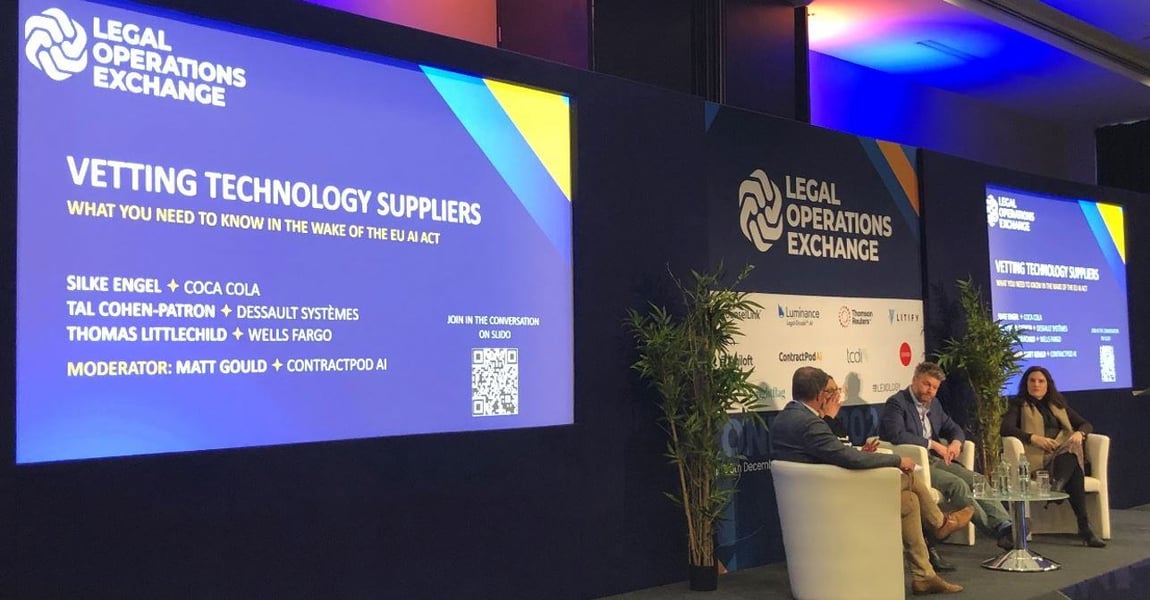
Legal Ops need to know the pain point AI will solve
Machine learning models will transform legal ops and make paralegals obsolete in ten years. That was one of the scenarios envisioned in a lightening debate at the Legal Ops Exchange conference held at Syon Park in London.
Senior legal experts attending the two-day event had a more balanced, pragmatic view of the future.
First understand the basics of AI
Knowing the pain point you want to solve with an AI tool before you adopt new technology was a key message from Tal Cohen-Patron of Dessault Systems. Fellow panellist Silke Engel of Coca Cola emphasised the need to invest in high-quality prompt engineering to guarantee machine learning models deliver the results you want, in the longer term.
Whilst Thomas Littlechild of Wells Fargo reminded AI vendors that he and many buyers are not tech savvy. Therefore, AI products must be easily explainable to regulators and senior managers, otherwise they will not be well received.

Know the risks of AI in legal ops
The ability to trust results generated by machine learning models was seen as a top priority. Ingesting data into AI engines that is incorrect can result in trust being lost forever. Therefore, experts stressed the importance of vetting suppliers and AI tools, and including a human in the process to ensure AI output is always correct.
The integrity of AI is paramount because there may be liability for organisations under regulatory principles albeit these may not be enshrined in law yet.
Ownership of assets used to train AI models such as customised prompts and training datasets is a consideration that must not be overlooked when selecting an AI technology supplier.
Similarly, there are risks and opportunities associated when integrating solutions. To protect information, careful attention must be given to granting permissions that govern who can see data, and what data an AI tool is able to access.
The future of AI in legal ops
More collaboration between people and AI, and a future where machine learning models with different domain specific knowledge talk together, were some of the blue-sky thinking that resonated among experts.
- A consensus appeared to form that whilst it was accepted that AI will eventually replace many repetitive tasks in legal ops, the human-in-the-loop was essential to promote trust and ensure errors are identified.
This requirement to have a human verify datasets used to train machine learning models is creating a global swathe of new jobs to manage a process known as data labelling or annotating. At Open AI for example, thousands of people are employed to spot fake, offensive and biased information.
The new legally qualified AI verifiers
“In legal ops, Private AI tools like CoPilot and GPT can now complete tasks such as research in a fraction of the time it takes a professional”
says Ksenija Fedorenko, Head of Legal Compliance at Guildhawk. Instead of displacing humans, AI may lead to an increase in jobs because the results generated by machine leaning must be verified.
Improving data labelling and creating a new method to anonymise data is the focus of new cutting-edge R&D by AI experts Dr Francimaria Nascimento, Shashwat Upadhyay and Professor Alex Shenfield in a collaboration between Sheffield Hallam University and Guildhawk. In a recent podcast on using AI to fight fake news, experts described how introducing more humans to verify training datasets improves trust.
Thus, the future of AI in the legal sector looks set to become one of human experts collaborating with AI, not being replaced by AI.
Automating legal translations with AI
AI is revolutionising the automation of translations in the legal sector with new secure tools like GAI Translate™ now able to generate accurate results quickly due to training on large volumes of verified multilingual datasets.
But here too, there is a continuing demand for human verification, to give a final sign-off that guarantees legal translations are 100% accurate. AI is helping humans to automate the process with tools like Expert-in-the-Loop (EITL), a one-click feature in GAI Translate™, that empowers users to send content translated by the AI tool to a certified linguist who will verify and amend if necessary.
AI is the autopilot not the captain
Patti Kachidza, Co-Chair of Interlaw Diversity Forum, who was a speaker at Legal Ops Exchange, provided a reminder of the ultimate value of experts keeping AI in check – to increase trust. Like passengers on a long-haul flight, there is comfort in knowing a qualified pilot is in charge, even when the autopilot is switched on.
- As AI is adopted in the legal sector, one can imagine how clients will feel reassured to know that all advice and information they receive has been verified by a human.
About legal ops exchange
The Exchange unites peers in the legal sector to gain the essential skills and knowledge needed to seamlessly blend legal expertise with technological innovation and generative AI.
From mastering new tools to honing your soft skills for change management, the Exchange ensures that departments don’t fall behind by discovering ways to a brighter, more efficient future.
Lean more about AI solutions
 To learn more about how AI translation with Expert-in-the-Loop can transform your legal operations, contact Ksenija Fedorenko, head of legal and corporate compliance at Guildhawk. Ksenija holds a Master of Laws (LL.M.) degree from University College London, and a Master degree in Law from Vilnius University, Lithuania.
To learn more about how AI translation with Expert-in-the-Loop can transform your legal operations, contact Ksenija Fedorenko, head of legal and corporate compliance at Guildhawk. Ksenija holds a Master of Laws (LL.M.) degree from University College London, and a Master degree in Law from Vilnius University, Lithuania.
